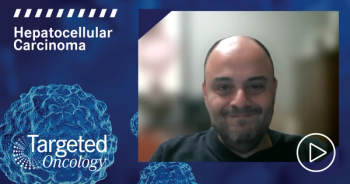
Abou-Alfa Gives Expert Insights for Liver Cancer Awareness Month
Ghassan K. Abou-Alfa, MD, reviews the liver cancer landscape and the collaboration of Memorial Sloan Kettering Cancer Center with other institutions to further treatments in this setting.
“I have liver cancer. What should I be excited about?” A question any patient or loved one may ask nowadays. One may also wonder, “What is exciting my medical oncologist?”
As a medical oncologist who has dedicated his career to liver cancer, I have lived liver cancer with my dear patients for more than 20 years, and I have witnessed it all. I recall the days there were no therapies of any kind that would help patients with liver cancer. I recall those sad discussions with patients and their loved ones. Our persistence as a great medical and scientific team at Memorial Sloan Kettering Cancer Center, and in collaboration with colleagues around the world, led us to lead the first clinical trial ever on sorafenib (Nexavar) in liver cancer. This was followed by 2 international randomized clinical trials that led to its FDA approval more than a decade ago.
Several years passed through with no other drugs approved. We were all busy though, evaluating different therapies or a combination of. Yet to no avail. With no despair, and while keeping the promise we gave to every patient and family, the pre-clinical science community continued its work, until collaboratively among many medical and scientific teams worldwide, patients now have access to 2 other therapies in the first-line setting: lenvatinib (Lenvima) and the combination of atezolizumab (Tecentriq) plus bevacizumab (Avastin).
Ten years ago, this would have been presumed the end of the story as all research teams were struggling to further define and improve on first line treatments. Nobody would have thought of tackling second line therapy. Now with 3 treatment regimens that are well established as first-line treatment; second-line therapy became the new frontier. We now have available for all patients, regorafenib (Stivarga), ramicirumab (Cyramza), and pembrolizumab (Keytruda). At Memorial Sloan Kettering Cancer Center and in collaboration with other colleagues, we went even further, and not only tackled second-line therapy with the advent of cabozantinib (Cabometyx), but also helped establish cabozantinib as the only FDA approved third-line therapy for patients with liver cancer.
Other combination therapies attacking different cancer targets and altering the cancer immune environment are already being studies with many clinical trials underway or completed accrual and we are awaiting the results, which are all exciting and hold great promise. Beside the combination of targeted therapy and immunotherapy like lenvatinib plus pembrolizumab and cabozantinib plus atezolizumab, a very novel and innovative concept is the combination of immunotherapy. While nivolumab (Opdivo) plus ipilimumab (Yervoy) has already FDA conditional approval. Another exciting combination of immunotherapy is of durvalumab (Imfinzi) plus tremelimumab, which is under study. The Himalaya study (NCT03298451) is the largest liver cancer clinical trial ever with more than 1000 patients.
To improve liver cancer care from 1 drug to now 8 drugs or combination of, in less than 10 years can explain why patients, loved ones, and caring physicians, are excited. This is monumental, and we will not stop there. Extending survival and living with cancer is a big deal. It is always a delight to hear a dear patient negotiating when is the next visit or treatment is because they feel like going on holiday. Being involved and caring for life events, vacations, and more, is a firm confirmation of a patients regain of the purpose of life, which drives us all.
In collaboration with colleagues throughout the globe, we are already looking into other venues and techniques, and we are not leaving any stone or pebble unturned. We want to stop guessing how a patient may do on a certain therapy. We are proudly leading a global effort to better define how the risk factor and many components of the tumor immune microenvironment can help define who will respond to which therapy.
At Memorial Sloan Kettering Cancer Center, we are and will remain busy with further fine-tuning the therapies and combinations of for patients with liver cancer. With the help of advocacy groups like Blue Faery and others, we will keep focused on the ultimate goal all patients and loved ones talk and ask about: cure. We are already looking beyond targeted therapies and immunotherapy. We are harvesting tissue from almost every biopsy we need to confirm the diagnosis and look for the novel targets we can train the immune cells of a patient to get rid of them all, similar to a CAR (chimeric antigen receptor) T gene or cell therapy.
One might understand why we should all be excited about the treatment of liver cancer. This is time to celebrate and continue to further momentum towards the goal of cure.








































